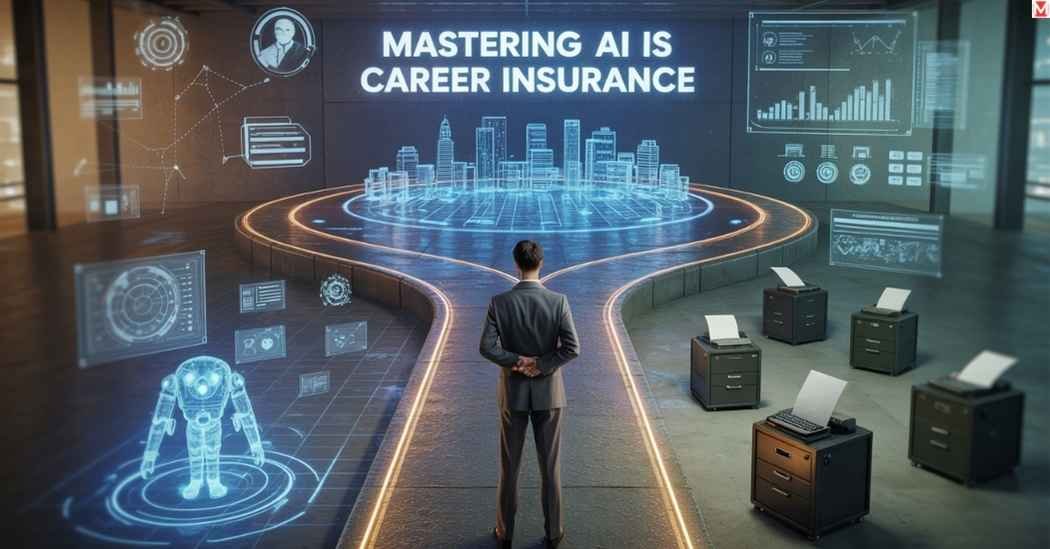
AI is job security, a truth that we are using to reimagine what job security means in 2025. Breaking with traditional strategy, it’s now as silly to work without the right AI skills as it is to drive without car insurance.
Sarah Chen got a lesson in this the hard way. She was a marketing manager at a midsize tech company and watched younger colleagues race ahead of her in promotions. The turning point? Then she found that ChatGPT could manage her basic duties in a few minutes, instead of a few hours. Six months later, Sarah had tripled her productivity and was promoted to senior director.
The statistics tell the story. Recent job market research indicates that 40% of all jobs on the market will incorporate AI knowledge by 2030. By contrast, workers who are fluent in AI earn on average 25% more than their peers. The message is clear: AI is career insurance in an uncertain future.
This is not about replacing people with machines. – It’s a story of smart professionals using AI to become unstoppable in their careers. The decision is yours – get some upskilling now or continue to witness others accelerate past you.
Can't We All Just Get Along? How Do We Encourage AI and Human Synergies in the Workplace?
The entire “AI vs humans” narrative is the single biggest career myth that is killing opportunities today. Business leaders who understand that are building workplaces where human skills and artificial intelligence cooperate seamlessly.
Dr. Martinez is the Cleveland Clinic personification of that collaboration. She processes patient symptoms in seconds using AI, but her human expertise manages the emotional conversations families want to have. The result? 40% more productive and with the highest patient satisfaction scores on record.
The Partnership Reality
Such real workplaces demonstrate to us what real collaboration looks like. At Netflix, data analysts also employ machine learning to detect viewing patterns and build human stories to steer content choices. Educators make use of Microsoft Copilot for curriculum planning, which allows them to spend more time making connections with students. These examples highlight why Mastering AI Career Insurance is more important than ever. In today’s evolving job market, Mastering AI Career Insurance ensures professionals stay ahead by adapting to intelligent tools reshaping every industry.
The magic occurs when we no longer view AI as a competitor. Generative A.I. deals with all the routine stuff writing up first drafts, scanning spreadsheets, scheduling meetings. That frees up humans for creative strategy, building relationships, and solving complex problems.
Job satisfaction rises as employees turn to AI technology. A 2024 study found that 78 percent of workers who have access to AI assistants in the workplace are more satisfied in their jobs than those who are still forced to do menial tasks.
Breaking Down the Fear Factor
The “AI will take my job” mindset is backwards. People who refuse to adapt get displaced from a job; those who accept change do not. Mastering AI Career Insurance helps professionals shift from fear to confidence. AI is fear relief for smart pros who suffer career FOMO. Embracing Mastering AI Career Insurance means turning uncertainty into opportunity.
Zappos does this with its customer service teams. When they put in place AI Copilot systems, salespeople were not fired they evolved into problem-solving specialists. Mastering AI Career Insurance gave them the mindset to work with AI, not against it. The A.I. fielded simple questions; humans received more complicated ones that involved personal skills, showcasing the value of Mastering AI Career Insurance in real-world team dynamics.
It is easier than ever for companies to leap to do so with the advantages of cloud-based technology. Workers can access AI training platforms from wherever they are, developing skills at their own pace without having to forgo work at the moment.
Collaboration, Not Condemnation
Firing people for their company adopting AI is a million-dollar mistake. Forward-looking business leaders know that giving workforce priority is about supporting and developing your people, not replacing them.
The story of IBM’s transformation makes the point nicely. Instead of widespread layoffs, the company retrained 100,000 employees for AI-augmented roles. The increase in productivity was amazing 60% more productive teams without compromising employee priority at the core of the company culture.
The Smart Integration Approach
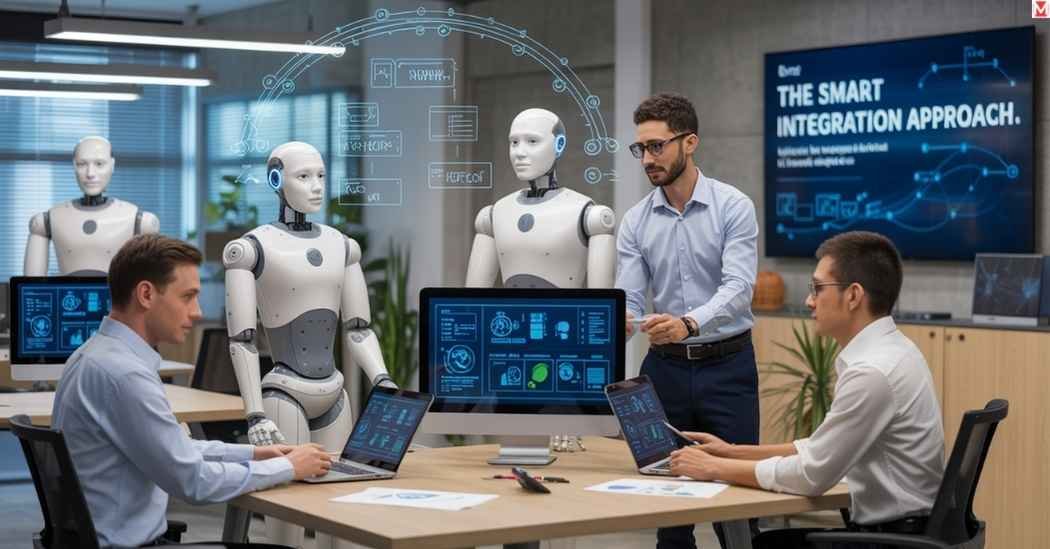
AI work, in business and beyond, that succeeds, is all about augmentation, not replacement. They build systems to allow humans to work with intelligent machines, not against them.
On the floor of Siemens manufacturing plants, workers have become AI system supervisors. Their indefinable human knowledge of the way machines act turned out to be priceless for teaching cognitive computing systems. Boosting productivity was a happy by-product – workers worked faster and were more effective.
Success Stories from the Trenches
Real transformation happens when industry leaders support their teams through change. Consider these examples:
- Legal firms: Paralegals evolved into AI-assisted research specialists, doubling case preparation speed
- Accounting departments: Bookkeepers became financial analysts using cloud systems for data processing
- Healthcare teams: Nurses use AI generation for documentation, spending more time with patients
These success stories have several underlying elements. Corporate leaders bet on training, rather than replacement. Workers acquired new skills that made them no less valuable, but more so. Mastering AI Career Insurance becomes essential in such cases, as reskilling empowers employees instead of replacing them. AI will be career insurance if you do it thoughtfully. That’s why Mastering AI Career Insurance is not just a strategy—it’s survival.
Sarah Chen found out the hard way. She had observed younger colleagues whoosh past her in promotions as a marketing manager for a midsize tech company. The turning point? But then she found out ChatGPT could take care of all those dinky admin tasks she managed to cram within hours. In six months, Sarah’s productivity tripled, and she was promoted to senior director. Her story is a powerful example of how Mastering AI Career Insurance can reshape your professional path.
Overcoming Resistance
The “I’m no good at learning” mindset kills careers faster than any AI system. Mastering AI Career Insurance means challenging that belief head-on. These are the business managers who foster an environment where employees are encouraged to overcome this resistance and, as a result, build stronger and more flexible teams. Promoting Mastering AI Career Insurance creates a culture of adaptability that pays off.
Gradual integration works best. Begin with unobtrusive AI tools, like a personal email or calendar AI assistant. Gain confidence with small victories before reaching for the more ambitious generative intelligence applications. Step-by-step adoption is a powerful part of Mastering AI Career Insurance.
Human investment should be prioritized over job creation. As long as workers consider AI a tool they are using, rather than a replacement, AI isn’t workplace disruption – it’s workplace evolution.
Upskilling and New AI-Related Jobs
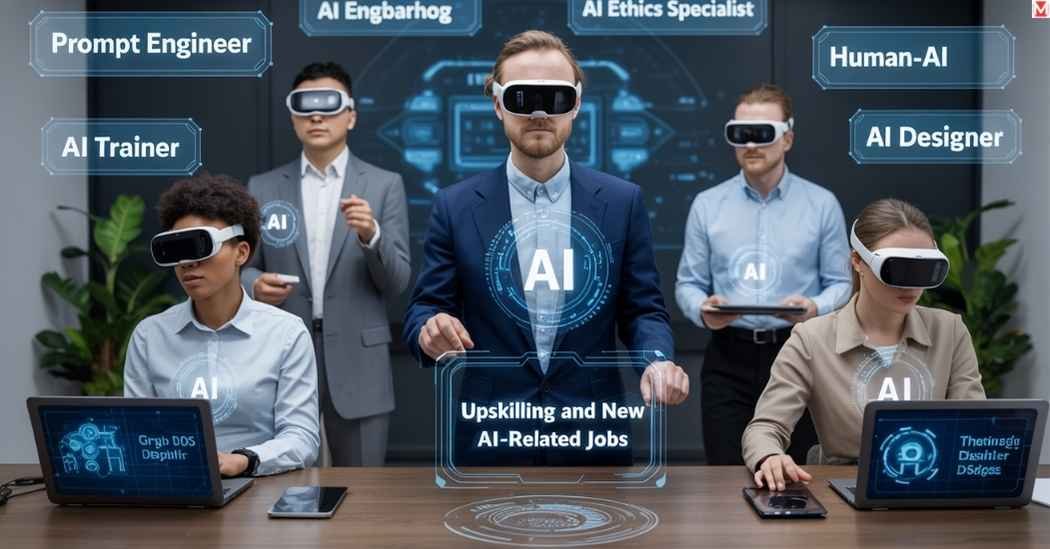
While everyone worries about disappearing jobs, entirely new career categories are exploding into existence. AI is career insurance for those smart enough to grab these opportunities early.
Prompt engineers now earn $300,000+ salaries at major tech companies. AI trainers teach machines industry-specific knowledge. Human-AI interaction designers craft seamless workflows between people and automated intelligence.
The New AI Job Landscape
| Job Title | Average Salary | Growth Rate | Key Skills |
|---|---|---|---|
| AI Prompt Engineer | $250,000 - $350,000 | 400% annually | AI literacy, creativity, and communication |
| AI Ethics Specialist | $180,000 - $280,000 | 350% annually | Human skills, policy knowledge, and critical thinking |
| AI Trainer | $120,000 - $200,000 | 300% annually | AI understanding, industry expertise, and patience |
| Human-AI Designer | $140,000 - $220,000 | 280% annually | AI fluency, user experience, and psychology |
These aren’t theoretical positions. Companies desperately need people who understand both artificial intelligence capabilities and human expertise requirements.
Essential Skills for AI-Ready Professionals
Technical skills matter, but not in the way you might think. You don’t need computer science degrees or coding bootcamps. Mastering AI Career Insurance starts with understanding what these tools can and cannot do.
Basic prompt engineering applies to every role. Marketing professionals use it for content creation. Project managers leverage it for planning. Sales teams apply it for customer research. That’s why Mastering AI Career Insurance is no longer optional it is a core skill. As AI proficiency becomes a universal workplace skill, Mastering AI Career Insurance ensures you’re not left behind but leading the curve.
Human abilities become even more valuable in AI-enhanced workplaces:
- Critical thinking to evaluate AI outputs
- Emotional intelligence for relationship management
- Creative strategy that machines cannot replicate
- Complex communication to explain AI insights to stakeholders
Your Upskilling Roadmap
Phase 1 (0-3 months): Foundation Building
Start with free AI literacy courses from platforms like Coursera or LinkedIn Learning. Experiment with ChatGPT, Claude, or Microsoft Copilot daily. Join AI communities on Reddit or Discord where professionals share real-world applications.
The key is consistency. Spend 30 minutes daily exploring how generative AI applies to your specific role. AI is career insurance – small daily investments create massive long-term advantages.
Phase 2 (3-6 months): Specialization
Focus on industry-specific AI applications. Healthcare workers explore medical AI tools. Marketers master AI copywriting platforms. Finance professionals learn AI-powered analytics systems.
Build your first AI-enhanced project portfolio. Document the productivity gains you achieve. Measure time savings and quality improvements. These metrics become powerful resume additions.
Phase 3 (6+ months): Mastery and Leadership
Position yourself as the go-to AI person in your organization. Teach colleagues basic AI knowledge. Develop proprietary AI workflows that solve specific business problems.
Business leaders notice employees who drive productivity boosts through smart tool adoption. This visibility often leads to promotions and leadership opportunities where AI is career insurance that pays its biggest dividends.
ROI of AI Upskilling
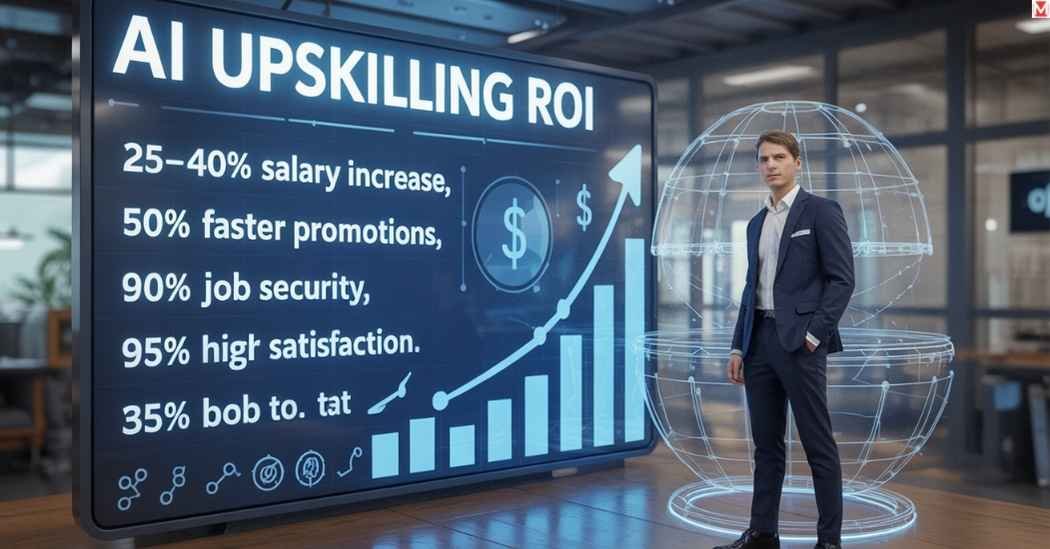
The numbers don’t lie. Professionals with AI fluency see:
- 25-40% salary increases within 18 months
- 50% faster promotion rates compared to AI-resistant peers
- 90% job security even during economic uncertainty
- 35% improvement in work satisfaction scores
Cloud technology is making this upskilling possible in unprecedented ways. You can learn AI competencies from anywhere, at any time, and often for free.
AI is going to be career insurance — this becomes more obvious every day. The combination of small daily gains in AI learning results in huge career advantages over time.
As others argue about whether A.I. will be good or bad for humanity, smart professionals are already incorporating skill sets that allow them to become indispensable. They know that artificial intelligence is not about the replacement of humans; instead, it’s the enhancement of the humans who choose to level up.
It’s not a matter of if AI will affect your profession. It’s when it happens, if it does. AI is career insurance in a world of uncertain futures, but doing it will take a bit of time — precious time you need to get started on today.
Your future self will thank you for these AI skills you start to learn this month. The decision is straightforward: Upskill now or get left behind. What will you choose?
Frequently Asked Questions
What career path is safe from AI?
Jobs least likely to be affected by automation are commonly found in the following fields: Health Care: Nurses, doctors, therapists, and counselors. Education: Teachers, instructors, and school administrators. Creative: Musicians, artists, writers, and journalists.
Will AI affect future careers?
Generative AI and robotics are causing job losses. Goldman Sachs predicts that 50% of jobs could be fully automated by 2045. Last year, Goldman Sachs predicted that AI might displace 300 million jobs from the marketplace, upending as much as a quarter of the job market.
Will AI replace full-time careers for some employees?
The question, “Is AI taking over jobs?” is no longer speculative. The World Economic Forum (WEF) reports that AI and automation could displace 85 million jobs by 2025, but also create 97 million new roles more aligned with the division of labor between humans, machines, and algorithms.
Will AI replace actuaries?
Learn Technology: AI and machine learning aren’t replacements for actuaries they are tools to help actuaries do their jobs better. Automation deals with the repetitive, leaving the actuaries with the time to focus on strategy and innovation.
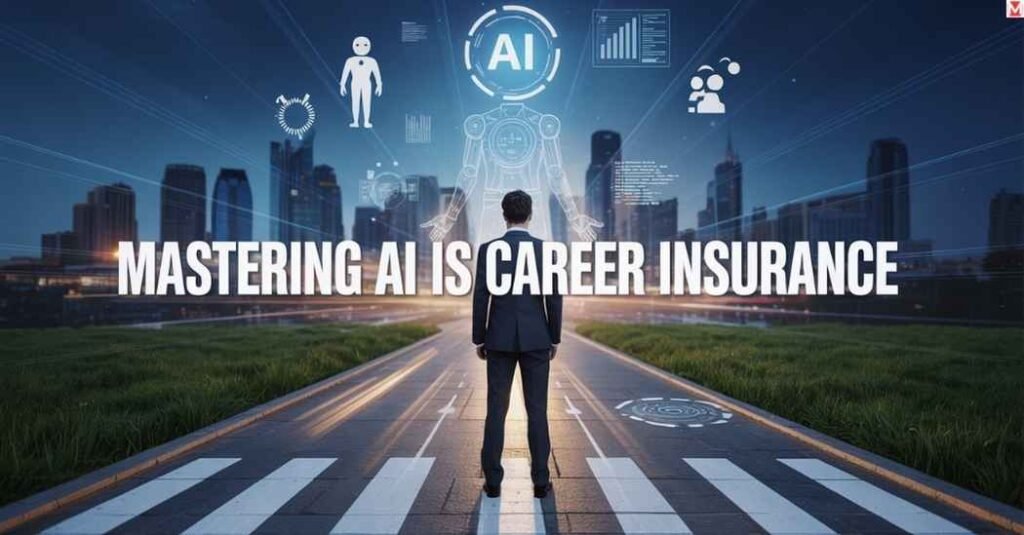


Pingback: What Is Smart Response Technology And How It’s Changing US Services?